Exploring the Eczema & Food Allergy Risk Link with Rebecca Hartman, MD MPH
- How food allergy risk and eczema are related and what ingredients you want to look for when selecting skincare products for your whole family (...and what to leave out)
- What skin reactions look like in babies of different skin colors and what key feature of hives are
- Why you shouldn't feel bad if your baby had eczema and then develops a food allergy (it happened to her and Dr. Hartman is sharing her baby's food allergy story here too).
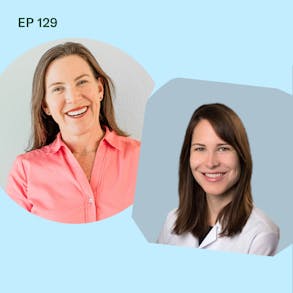
LISTEN TO THIS EPISODE
Episode Description
Did you know that varying degrees of eczema in your baby can impact food allergy risk? In this episode dermatologist, BLW and food allergy mom Rebecca Hartman, MD, MPH is joining me to talk about how eczema and food allergy risk are linked.
Dr. Hartman is part of the Evereden skincare brand’s team of “Moms in Medicine”. She helps co-create formulas and in this episode is also breaking down what ingredients you want to look for when selecting skincare (...and what to skip) because what you put ON your baby’s body is just as important as what you put IN it.
Get 15% off Evereden (excluding bundles & sunscreen) with code KATIEF15 (this is an affiliate code).
About the Guest
- Dr. Rebecca Hartman is a board-certified dermatologist and dermatology instructor at Brigham & Women's Hospital, an affiliate within the Harvard network. She is also a new mom to a now 6-month-old son, who she is undergoing the process of baby led weaning with right now! Her areas of specialty include melanoma and skin cancer research, but as a new mom whose son has mild eczema, she is very empathetic to her patients whose children may be going through the same thing.
- She is a part of Evereden's team of Moms in Medicine - and she co-creates formulas, offers expertise on certain ingredients, and gets in the weeds with us on recent applicable research.
Links from this Episode
- Dr. Hartman’s Linkedin: https://www.linkedin.com/in/rebecca-hartman-59a765a/
- US news: https://health.usnews.com/doctors/rebecca-hartman-773592#hospitals
- Dr. Hartman’s publications listed here: https://connects.catalyst.harvard.edu/Profiles/display/Person/98950
- Read about Dr. Hartman on Ever-Eden https://www.ever-eden.com/pages/moms-in-medicine
- Evereden discount code (this is an affiliate code) for 15% off excluding bundles and sunscreen at ever-eden.com: KATIEF15
- Read some Ever-Eden Blogs on skin care :
- Step-by-Step guide to bathing your newborn: https://www.ever-eden.com/blogs/skin-health/why-babies-get-acne-and-what-to-do-about-it
- Why babies get acne and what to do about it?: https://www.ever-eden.com/blogs/skin-health/why-babies-get-acne-and-what-to-do-about-it
- Baby-Led Weaning with Katie Ferraro program with the 100 First Foods™ Daily Meal Plan, join here: https://babyledweaning.co/program
- Baby-Led Weaning for Beginners free online workshop with 100 First Foods™ list to all attendees, register here: https://babyledweaning.co/baby-led-weaning-for-beginners
Resources & Research
- Johnson, J. L., Gupta, R. S., Bilaver, L. A., Hu, J. W., Martin, J., Jiang, J., ... & Togias, A. (2020). Implementation of the Addendum Guidelines for Peanut Allergy Prevention by US allergists, a survey conducted by the NIAID, in collaboration with the AAAAI. Journal of Allergy and Clinical Immunology, 146(4), 875-883. https://pubmed.ncbi.nlm.nih.gov/32745556/
- Schroer, B., Groetch, M., Mack, D. P., & Venter, C. (2020). Practical Challenges and Considerations for Early Introduction of Potential Food Allergens for Prevention of Food Allergy. The Journal of Allergy and Clinical Immunology: In Practice. https://pubmed.ncbi.nlm.nih.gov/33127520/
- Fleischer, D. M., Chan, E. S., Venter, C., Spergel, J. M., Abrams, E. M., Stukus, D., ... & Greenhawt, M. (2020). A Consensus Approach to the Primary Prevention of Food Allergy Through Nutrition: Guidance from the American Academy of Allergy, Asthma, and Immunology; American College of Allergy, Asthma, and Immunology; and the Canadian Society for Allergy and Clinical Immunology. The Journal of Allergy and Clinical Immunology: In Practice. https://pubmed.ncbi.nlm.nih.gov/33250376/
- Obbagy, J. E., English, L. K., Wong, Y. P., Butte, N. F., Dewey, K. G., Fleischer, D. M., Fox, M. K., Greer, F. R., Krebs, N. F., Scanlon, K. S., & Stoody, E. E. (2019). Complementary feeding and food allergy, atopic dermatitis/eczema, asthma, and allergic rhinitis: a systematic review. The American Journal of Clinical Nutrition, 109(Suppl_7), 890S–934S. https://doi.org/10.1093/ajcn/nqy220. https://pubmed.ncbi.nlm.nih.gov/30982864/

Latest Episodes
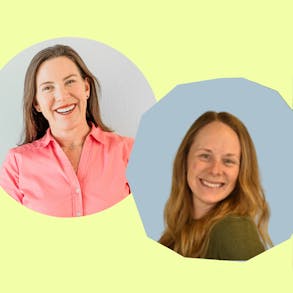
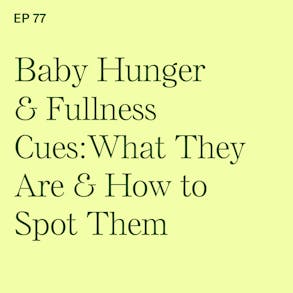
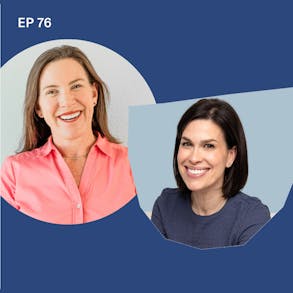
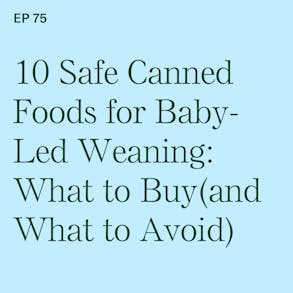
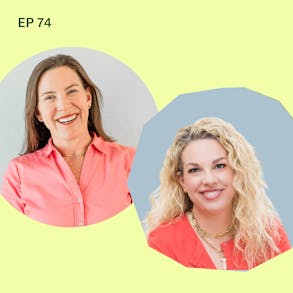
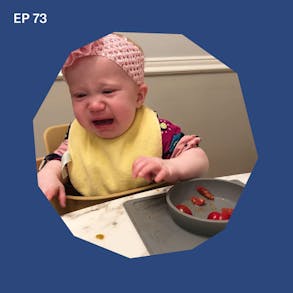
Dr. Rebecca Hartman (1s):
You know, they have this clean hypothesis. We live these very clean lives and so our bodies don't see all these other allergies to react to them. And so, unfortunately, when they're not challenged, sometimes then they react to benign innocuous things like peanuts.
Katie Ferraro (13s):
Hey there, I'm Katie Ferraro, Registered Dietitian, college nutrition professor, and mama of seven specializing in baby led weaning. Here on the Baby-Led Weaning Made Easy podcast I help you strip out all of the noise and nonsense about feeding, leaving you with the competence and knowledge you need to give your baby a safe start to solid foods using baby led weaning. You guys. Welcome back today. This topic is a little outside of like the typical baby Led Weaning content arena, because we're going to be talking about eczema and you might be like Katie, or you talking about eczema on a baby Led Weaning podcasts, but they are linked or they may be, or there's some research that indicates eczema in babies can possibly increase Food Allergy Risk and managing.
Katie Ferraro (59s):
It might help reduce risk for food allergy development, but it's all this like huge, big gray area. Super confusing to me, even as a practitioner in this field, super confusing to parents. So that's exactly why I asked my guest Dr. Rebecca Hartman to join me so we can explore this link between eczema and Food Allergy Risk. So Dr. Hartman is a board certified dermatologist. She also has an MPH. So a master's in public health. She's really into research and kind of the nitty gritty at looking at some of these recommendations. She's an instructor in dermatology at Brigham and women's hospital in Boston. It's a major teaching hospital and Harvard medical school. And Dr. Hartman is also affiliated with the Dana Farber cancer Institute. She is a medical advisor to Evereden.
Katie Ferraro (1m 39s):
So Evereden is a company that makes all natural skincare products for babies and adults. And Dr. Hartman is actually here on behalf of Evereden she's part of their moms in medicine team. She helps you co-create formulas and she offers expertise on certain ingredients and then interprets the research like we're going to do today with regard to eczema and Food Allergy Risk. So she's got this great professional background, but Dr. Hartman is also going to share in the interview a little bit about her personal situation, which is she is a new mom. She has a son named Ethan. He just turned seven months old. He's had mild, which she said is now like getting worse eczema. And she's going to explain the difference between mild, moderate, severe eczema, because that's confusing to parents.
Katie Ferraro (2m 20s):
So her baby's always had eczema, but she's doing baby Led Weaning. She actually said she listened to the podcast even before we connected, which was so cool. So glad I got to talk to her about both baby Led Weaning and her area of expertise, which is dermatology. But she's going to talk today about how, when she introduced some of the allergenic foods that her baby did have reaction. So now they actually suspect peanut allergy. They're working on testing with her son, Ethan, and then possible tree nut allergy. So when I first started talking about the link between eggs and on Food Allergy Risk, some parents are reaching out saying, God, I feel so guilty. I feel like you're accusing me. Like my baby had eczema and then got a food allergy is because I didn't do something. And I just want to clarify right off the bat, that the point of this podcast is not to make anybody feel bad if your baby has eczema.
Katie Ferraro (3m 3s):
And then later develops a food allergy, but rather to raise awareness to this emerging small amount of research that shows a possible link between eczema and food allergy and spoiler alert. If you don't wanna listen to the whole thing you should, because it's a great interview, but we really don't know how strong the link is, but it's important to have the people working in the field, interpret that. And on top of that, Dr. Hartman has a baby with eczema that probably has food allergies. So she's going through it just like a lot of you guys are. I mentioned that she's part of the Evereden's Moms in Medicine team. I do also want to disclose that I am an affiliate for Evereden. It's a brand that I was recently introduced to when one of my twins, my little guy Gussie had some really nasty eczema flare ups.
Katie Ferraro (3m 45s):
He'd never had it before. And like around two, it got super bad. So I started using Evereden. I was so impressed by it. I not only use it for all seven of my kids actually use it for myself, but I reached out to them to see if I could collaborate with them. So we're going to chat a little bit about what ingredients you look for and what to avoid when you're choosing products for your family skincare and Dr. Hartman. We'll dive deep on that for you guys. But if you do want to check out some of the Evereden products, I have a 15% discount code that you can use. It changes all the time. So I'll link to the current 15% code for Evereden in this SHOWNOTES FOR THIS EPISODE was you guys can find at BLW podcast.com forward slash one two nine. Again, BLW podcast.com forward slash one, two nine for that 15% discount code for Evereden.
Katie Ferraro (4m 31s):
So with no further ado, let's explore the eczema and Food Allergy Risk Link with Dr. Rebecca Hartman. Thank you so much, Dr. Hartman for being on the podcast with me, this is a real treat.
Dr. Rebecca Hartman (4m 44s):
Thank you so much for having me. I'm really excited to be here.
Katie Ferraro (4m 47s):
A little bit about your background and the work that you do as a dermatologist?
Dr. Rebecca Hartman (4m 50s):
Sure. So I'm a dermatologist. I work at a Brigham and women's hospital in Boston, which is affiliated with Harvard medical school. And I also very proudly serve our veterans at the VA in Boston. There are no baby veterans that I've seen fortunately, but I do like working with the veterans as well. And I'm also a mom. So I have a seven month old named Ethan, and we are embarking on the adventure of baby led weaning together.
Katie Ferraro (5m 13s):
Can you tell me a little bit about how it's going, everyone? I know everyone will have lots of questions about Ethan, if you don't mind sharing. How has the introduction to solids gone?
Dr. Rebecca Hartman (5m 20s):
Yeah, so, you know, I had a lot of friends. I had like a cousin who did the baby Led Weaning, and I had another friend, you know, it's something that I think is getting more and more interest now. And so at six months we tried it. And what I just want to say to those moms out there and doing it is it definitely takes some time. Like the first month I was like, oh my goodness, this is never going to work. He just sits there. He like pulls out his bed. He plays with the food. It's like, you can pick it up and something after like a month, it just clicked. And now he is a champion. It is going so well. He eats a variety of foods. He loves healthy foods. He loves like kale. He'll just suck on a piece of kale for, for a long time. He likes broccoli. He likes meat. We're trying to do a lot of iron rich foods. So it's actually, it's been really great.
Dr. Rebecca Hartman (6m 1s):
And one of the benefits I think that people talk about is like my husband and I can eat our dinner. And while he eats, I mean, we're watching him, of course, it's for choking and safety, but it's really nice and convenient and it just works well with our lifestyle. We just have some extra food and whatever we make it try to make it not too salty. And we give that to him.
Katie Ferraro (6m 18s):
I love to hear a baby Led Weaning success stories. And thank you for the reminder that it is really slow going at the beginning. And it doesn't mean you're doing anything wrong. Most babies that will click around for six, sometimes even eight weeks. So hang in there, mom, if you're just getting started. Dr. Hartman, I know we're here today to talk about the relationship between eczema and Food Allergy Risk. Do you mind sharing just a little bit about Ethan and have you introduced any of the potentially allergenic foods with him as part of baby Led Weaning?
Dr. Rebecca Hartman (6m 41s):
Yeah. So Ethan's is seven months old. He was pretty much exclusively breastfed until six months when we felt like you could sit up well and put food to his mouth. And then right away we introduced right before six months. Actually, I tried to introduce allergens based on the data from the leap study, which looked at infants age four to 11 months. The average age was around eight months and they randomly assigned them to eat about three teaspoons of peanut butter per week. And about three or more meals versus just avoiding peanuts because the older teaching was just to avoid allergens. And the kids that ate the peanut butter regularly actually had far fewer allergy to peanuts. So there was an 86% reduction in the risk of peanut allergies for those kids that ate the peanut butter regularly.
Dr. Rebecca Hartman (7m 24s):
So knowing this data as a doctor, I right away tried to give Ethan some peanut butter right before six months. And unfortunately with this first exposure, he got high. So we did some subsequent testing and we think he's probably peanut allergic, unfortunately. Okay. What about tree nuts? Yeah. So tree tree nuts. We didn't almond butter a couple of times and he did well, but we tried cashew butter and he got a rash on his face. So we're going to do more testing for that. So unfortunately I think about a third again, I'm not an allergist, so I apologize. And my allergy, data's not spot on, but dermatology, you can hold me to it. But about a third of the kids with the peanut allergy or about a fifth can also have the tree nut allergy is my understanding.
Katie Ferraro (8m 1s):
And do you mind sharing just a little bit more about like the peanut reaction? Like what did the hives look like and why were those potentially more concerning to you than just the rash that he got on his face from cashew? Like, was it full body hives? Are there changes and breathing? Anything else you saw from peanut?
Dr. Rebecca Hartman (8m 14s):
Yeah. So fortunately for him, it's just been rashes, although I do. So there's some question of peanut capacity and breast milk. So I've noticed sometimes if I eat peanut butter and then I nurse, him, I feel like he spits up more, but anyways, that may be anecdotal. But as a dermatologist, the key to hives is that you see these kind of red ill-defined splotchy areas, but they also have edema. There's some swelling. So they have these pale areas with pallor that are swollen. So to me, as, as a dermatologist, he pretty, clear-cut had hives and hives are concerning for a food allergy because they're mediated a different way than like an eczema or another type of rash. And the way that they're mediated can unfortunately also be associated with more severe types of reactions, like anaphylaxis, which could involve problems like vomiting, Babies can actually go limp.
Dr. Rebecca Hartman (8m 59s):
And then the most feared complication of anaphylaxis is, is if their blood pressure drops, that can be a very dangerous situation. So unfortunately he just had the hives, but with allergies like this, my understanding from the allergist is, are really unpredictable. So a prior mild reaction does not predict the severity of a future reaction. And so once you see how it's going to baby with food introduction, it's time to take it seriously and bring it to your doctor. And
Katie Ferraro (9m 23s):
Certainly one of the reasons why we recommend introducing it early and often is because it's actually quite unlikely to see the allergic reaction on the first exposure. It tends to be on the second or subsequent exposure as it can certainly happen on the first, but can also happen on the fifth or the sixth. And that's why we encourage parents. You know, you do shrimp once it's not one and done, you got to continually be re-introducing these foods into the baby's diet. So for our parents that are here, they're interested in the early introduction of allergenic foods. They know there's some data that shows that may help prevent food allergy. Could you speak to the relationship between eczema and Food Allergy Risk? How are those two topics linked?
Dr. Rebecca Hartman (9m 57s):
Yeah, so it's interesting. When, before I had my son, I just always thought they were linked because it's genetic with people who are predisposed to eczema are predisposed to allergies. They call it the atopic March. They can get allergic rhinitis and they can get asthma. But as I did more reading and learned with my own son, they actually, people now think that atopic dermatitis or eczema in and of itself is a direct risk factor food allergy, because the skin barrier is abnormal. It's unhealthy in atopic dermatitis, and this can allow allergens in the air or in contact with our skin to see the immune system in a way that they normally would not be able to do so. And there's some thought that seeing the allergens in your gut through eating promotes a healthy response to these allergens, we're seeing them in your skin does not.
Dr. Rebecca Hartman (10m 43s):
And that's probably part of why the early introduction is helpful, where we're showing these allergens through the gut and the guts were responding and saying, okay, these are safe. These are not a problem. So unfortunately for babies, with eczema, they're at high risk to have the allergens be exposed through their skin and develop an unhealthy response to them. And that's probably why my son, before you even tried, peanut butter had already had a reaction, but he may have gotten it some through the breast milk. There's some thoughts that it actually the peanut protein in some women in one study about half the women did pass it in their breast milk and have to not.
Katie Ferraro (11m 13s):
Thing that I think is confusing for parents. I know myself, I was confused when the leap, the learning early about peanut allergy trial results came out and we were really diving deep into it. Was that what was defined as high risk for peanut allergy, that criteria changed after that publication and to now, if a baby has severe eczema and or egg allergy, they're then considered to be high risk for peanut allergy, parents hear eczema and they're like, whoa, that's me. That's my baby, because my baby has eczema. Could you share a little bit about the difference between mild run of the mill eczema and the severe eczema that puts baby in high risk category for peanut allergy?
Dr. Rebecca Hartman (11m 46s):
Yeah, so, you know, it's really common for babies in general to have dry skin. Their skin barrier is just not mature and normal, like an adult skin barrier. So it has problems keeping the water in and babies have a lot more skin for their weight than adults do. So there's just a lot more ways that they can lose water through their skin. So it's not, it's not uncommon for kids to have or babies to have dry skin, you know, for eczema, there are different scoring systems, but one of the most common is the easy score EASI. And for that eczema is called mild. If it's just barely perceptible, there's not a lot of intensity for the redness thinking thickness, sorry, swelling, and like kind of vacation, like kind of vacation being thickening of the skin.
Dr. Rebecca Hartman (12m 28s):
It's rated moderate. If there's obvious abnormalities of the skin, like for example, my son, I would classify as moderate. Sometimes his whole back just feels rough and it's obvious that it's damaged skin. And then severe is where all the skin is really red and inflamed and you need to use prescription medicine. So most babies do not fall in the severe category and probably most fall and the mild. And then the next, you know, most common would be moderate. And I would say severe is pretty rare.
Katie Ferraro (12m 53s):
Okay. And so you're joining us today. The way I got introduced to you was through the brand Evereden, who I know you are on their team of Moms in Medicine. I believe you're on their medical advisory board. Could you share a little bit about why you decided to be affiliated with the Evereden brand as both a mom and a dermatologist?
Dr. Rebecca Hartman (13m 10s):
Yeah, so they approached me with their Moms in Medicine program. And when I learned about their brand, I really liked how their science backed. So they wanted me to work with them, to look at the evidence for ingredients. So I'm an epidemiologist. I have an MPH just like you, which I was excited to see the, that you have one as well. And certainly that helps us interpret studies and data. And they really want it to be very data-driven with their approach using ingredients that have evidence behind them. And so, and I love reading papers and, and examining the data. So I thought it was a great fit and I was really excited to help bring products to help kids and their families and their moms use ingredients that are evidence-based.
Katie Ferraro (13m 48s):
Yeah. And if you guys want to check out the Evereden products, I have a discount code. I'll put it on this show notes for this episode. If you guys go to BLW podcast.com and just search ever eat in this episode with Dr. Hartman will come up. And I know I was gifted products by the brand, which I get a lot of products for work, but this one was really unique. And as I started looking into it, I thought, wow, this is cool because not only are the founders moms, but they're also dermatologists working in medicine and research, because I know as a mom, it's really confusing. Like when you look at the products, like what ingredients do you want to have and not have? And I was curious if you had any tips for us as moms, dads, caregivers, trying to buy products, like, what do you like to see or not see in a product you're going to put on your baby's skin?
Dr. Rebecca Hartman (14m 27s):
I really want to see ingredients that have data behind them to work. And so those ingredients include things like colloidal oatmeal, which has been shown to restore the skin barrier and also to reduce inflammation, Serene mites, which are these really critical proteins in the skin that helped promote the lipid barrier, which protects the skin from water loss, sunflower oil has been shown to be anti-inflammatory and to help this skin. So these, some of the ingredients that I look for in products that I use, I am not, you know, a lot of moms like natural. I think natural has the potential to be great. I have to say to me, it doesn't matter as much if it's natural or not. I just care if the ingredients work with you. Yeah. Well,
Katie Ferraro (15m 5s):
And I think it's confusing, like at least in nutrition, the term natural means nothing. Like you can literally ascribe it to so many things that are quote unquote unnatural, that it gets really confusing. So sometimes parents like, just tell me, you know, I'm like, Hey, no added sugar and the food, no added sodium. Like, let's just keep it kind of simple if you can. Sometimes when you read ingredient lists, so they get really long. I like, I'm not a dermatologist. I don't know if this is good or not. So I do like taking recommendations from other moms, especially like a physician moms. So thank you for filling us in about the brand. Curious if you would share, I know your son has, would you say it's mild eczema or mild to moderate? How have you dealt with
Dr. Rebecca Hartman (15m 40s):
That? I now call it moderate. It's interesting. When he got the food allergy at the same time, his eczema was like horrible. And when I was talking to one pediatric allergist, she said, it's often like that. It's like, everything's going haywire at once. So I would say this, his eczema is moderate. I mean, we have had to use topical steroids for it. And we certainly see in our practice parents that are reluctant to use topical steroids because they're a prescription they're not natural, but it really worked amazing for my son. It calmed down his angry skin and he was really uncomfortable, which is any parent is hard to watch. And when I use them, they made a big difference. And now of course, the nice thing is you only need to use them as a rescue. And now we're just working on kind of maintaining the skin barrier and keeping the inflammation away by using some of these evidence-based ingredients that we discussed.
Katie Ferraro (16m 20s):
So I know that the research around Food Allergy Risk and eczema is still emerging. And I've had parents say that even when you broach this topic, they feel like it's their fault. If their baby had eczema and they then developed a food allergy, I'm so happy to have you on the podcast to help just raise awareness about the fact that there might be a link, but what do you say to parents who are like, oh my gosh, like you and yourself, you have a baby that has eczema and possibly has food allergy. Is this something that we did or didn't do? Like, how do you deal with that?
Dr. Rebecca Hartman (16m 46s):
Yeah. So that's a really tough one. I think as parents, we, you know, our instinct is always to blame ourselves or to be really hard on ourselves. And I think we have to do everything we can to, to try and not do that too much, because we're all trying to be the best parents we can be. Parenting is definitely tough. It's the hardest thing I've ever done harder than med school, harder than residency. So to all those parents working hard out there, I salute you, but I don't think there's anything that anyone did wrong. You know, this is probably a combination of genetics and environment, genetics. Like my husband has eczema and there's a common mutation. The filaggrin mutation, that's really common about one in three people have it, and it just predisposes you to eczema. And then environmentally, we are seeing just more and more eczema allergies, asthma in our society.
Dr. Rebecca Hartman (17m 27s):
And that's probably a reflection of, you know, they have this clean hypothesis. We live these very clean lives. We're not as, not as many people are working outdoors in the fields and the woods farming, you know, we're out working with farm animals. And so our bodies don't see all these other allergens to react to. And so, unfortunately, when they're not challenged, sometimes then they react to benign innocuous things like peanuts. But, you know, I don't think you can fault yourself. There's nothing that you did wrong. There's no data to show that there anything could have been done differently to prevent this from happening.
Katie Ferraro (17m 57s):
The thing I had wanted to ask you as a dermatologist at a I'm a fellow mom, but not a dermatologist. I have seven small kids. I hate bathing them. I only do it once a week. My grandma always said she bathed their kids once a week, whether they needed it or not. And I've heard that that might actually be beneficial that like bathing your kids too much could be problematic. One of my kids has really bad eczema. Just curious about your thoughts between bathing and then other things we can do for eczema control in our children.
Dr. Rebecca Hartman (18m 19s):
These are great questions. I agree. I think over bathing is a problem and can, you know, really hot water and harsh soaps can disrupt the barrier function of the skin and worsen eczema. And I really, for kids, I'm a fan of kind of age-appropriate bathing. So what that means is for the little babies, they really only need to be bathed once a week. Max, they're just not getting very dirty. They don't sweat. They don't go out and do much. Although they're working hard at developing their brains. They're not, they're not that active. And if you bath them more, you, you may be damaging their skin as babies get older, or like my son he's seven months and he has eczema. Then it's important to actually be a little bit more to try and keep bacteria down because bacteria and eczema have a complicated relationship where they both feed off one another.
Dr. Rebecca Hartman (19m 1s):
So eczema skin is much more prone to be colonized by staph, which is a problematic bacteria. So I can try to make my son at least twice a week for that. And I even do something called bleach baths, which I recommend you don't do unless you discuss with your pediatrician or dermatologists. This is something that needs to be discussed with a doctor and a decision made on an individual basis. But for us, I think it works well. And it involves basically using a very, very small amount of regular strength bleach in a full backup so that the chlorine concentration is like a pool. You never want to let the baby's head get in there. Of course, in general and a bath you're watching the baby. You don't want their head to get in the water, but just soaking them in that for a few minutes, can kind of the thought has helped decolonize some of that problematic bacteria from the eczema, and then you rinse it off.
Dr. Rebecca Hartman (19m 43s):
And then I let them have a regular bath. So you can play a little bit, but harsh bathing for long periods of time with hot water, harsh soaps definitely constrict the skin of its protective layers and can contribute to worsening eczema. So, and then of course I call it age appropriate bathing because this kids get older. If you have a 14 year old sweaty teenager, that's been playing soccer, then they probably need more regular baths and that would be age appropriate for them.
Katie Ferraro (20m 6s):
Were talking a little bit earlier about the signs and symptoms of food allergy. And I know it's not related to the eczema question, but one thing I share a lot on Instagram and parents share with me and I, and share with my audience are what pictures of what allergic reactions look like because they do manifest themselves differently, especially in children of different skin colors. And so sometimes I think we traditionally hear hives raised red itchy patches, but if a child has darker colored skin, it may not appear to be red. Do you have any tips for parents on what to be looking for for specifically for hives?
Dr. Rebecca Hartman (20m 37s):
Yeah. So that's a great question. And it's well known in dermatology that our images of skin problems are disproportionately in lighter skin. And that's a problem because we're not being trained appropriately to care for everyone. So I think it's a great question. High is the key feature of hives is that there were, we call edema, which means swollen and filled with fluid because what happens is there's so much inflammation that the blood vessels get leaky and they leak out their fluid. So a key feature of hives is that they should really be raised and swollen. And often they have surrounding redness and central pallor or loss of color, but certainly in darker skin types, redness could be more difficult to see. My son is what we would call skin type four. So he has kind of towards the more darker type skin his skin definitely did get red.
Dr. Rebecca Hartman (21m 21s):
So every baby's different, but I think the key is looking kind of for these raised spots, which, you know, a colloquial term would be like welt, but they're, they're kind of raised and swollen almost like a bug bite, a bug bite. It's like a localized.
Katie Ferraro (21m 33s):
Right? And, and this was kind of along the same lines, but I do a weekly free workshop called BABY LED WEANING FOR BEGINNERS. And at the end we answered the questions and I get like the same questions over and over, but I got a different one the other day, which was okay. Katie, you've been showing pictures, especially on social media of what babies of different colored skin look like when they're having a reaction. I'm not sure if you would know this because it's about skin and color. I want to ask you as a dermatologist, when we talk about the difference between gagging and choking, gagging being a good thing, baby tends to turn red or pink, but they're making noise. It's audible air is passing through with choking babies tend to turn blue and there is no noise in babies with darker skin. Does it look blue or what would you be looking for skin color wise? Anything you could speak to there if there's a potential choking incident.
Dr. Rebecca Hartman (22m 16s):
Yeah, so certainly, certainly that would be very scary, but I do think when babies are not getting enough oxygen, you can see the blue color really in any skin type. So, you know, around, around the mouth is one of the most common sites where you could see cyanosis. And so I think it would be visible even in a darker skin baby, but in general, with darker skin, the colors may be harder to see. So one may need to look more closely.
Katie Ferraro (22m 38s):
Well, Dr. Harman, thank you so much for your time. This has been incredibly informational. I know our audience is appreciative as well. Thank you for sharing your professional expertise, but also your personal story with your son, Ethan, where can our audience go to learn more about you and your work and also your affiliation with Evereden brands?
Dr. Rebecca Hartman (22m 54s):
Sure. So I can look me up at the Brigham website as well as at Dana Farber cancer center and everEden. I can be found on the Moms in Medicine page on their homepage
Katie Ferraro (23m 3s):
And I'll go ahead and link to that for you guys on the show notes for this episode at BLW podcast.com, Dr. Hartman, thank you so much.
Dr. Rebecca Hartman (23m 10s):
Thank you, Katie so much for having me.
Katie Ferraro (23m 13s):
It's my pleasure. Well, I hope you guys enjoyed that episode with Dr. Rebecca Hartman. I just love her. Not only is she like super smart, you know, the Harvard dermatologist, et cetera, but she's sharing her professional experience, but she's sharing her personal experience with us. And I love how she shared about her son, Ethan, and he's got eczema now appears to have the probable peanut allergy and possible tree nut allergy. And my intent in doing this episode was to help you guys realize that yes, it is a lot to deal with and manage, especially if you have a child with food allergies, but it's doable and the research is changing and we need to stay abreast of that. So I'm going to link to all of the resources that Dr. Hartman was mentioning in her episode on the SHOWNOTES FOR this page, which is BLW podcast.com forward slash one two nine.
Katie Ferraro (23m 58s):
She is a medical advisor to the brand EverEden. So she's part of their Moms in Medicine team. They're the dermatologist who are also moms who make all of their products and ingredients. If you want to check out the Evereden line, I have a discount code. It changes all the time. So I'm going to put it on the show notes page for this episode, BLW podcast.com forward slash one two nine, but you can get 15% off if you want to check out some of the evereden and products. I know I've been using them for one of my little guys has really bad eczema. And then I started using them for myself, like the baby face cream. I'm all about it. Like the best face lotion I've ever used. That is my affiliate code when you find it on the show notes page, but I also only work with them and recommend them because I absolutely love their products. And just want to say thank you again to Dr.
Katie Ferraro (24m 39s):
Hartman for coming on and sharing your story and helping us learn more about this link between eczema and Food Allergy Risk. Again, all the resources are linked at BLW podcast.com/129. Thanks for listening guys. Bye now!

The Program Baby-Led Weaning with Katie Ferraro
A step-by-step digital program for starting solid foods safely and navigating the original 100 FIRST FOODS™ meal plan with baby-led weaning.
 EXPERT-LED, PROVEN APPROACH TO EATING REAL FOOD
EXPERT-LED, PROVEN APPROACH TO EATING REAL FOOD CONCISE VIDEO TRAININGS TO MASTER BABY-LED WEANING
CONCISE VIDEO TRAININGS TO MASTER BABY-LED WEANING 100 FIRST FOODS DAILY MEAL PLAN WITH FOOD PREP VIDEOS
100 FIRST FOODS DAILY MEAL PLAN WITH FOOD PREP VIDEOS
Baby-Led Weaning for Beginners Free Workshop
Is your baby ready to start solid foods, but you’re not sure where to start? Get ready to give your baby a solid foundation to a lifetime of loving real food…even if you’re feeling overwhelmed or confused about this next stage of infant feeding.
Get baby-led weaning recipes and tips delivered to your email inbox.

